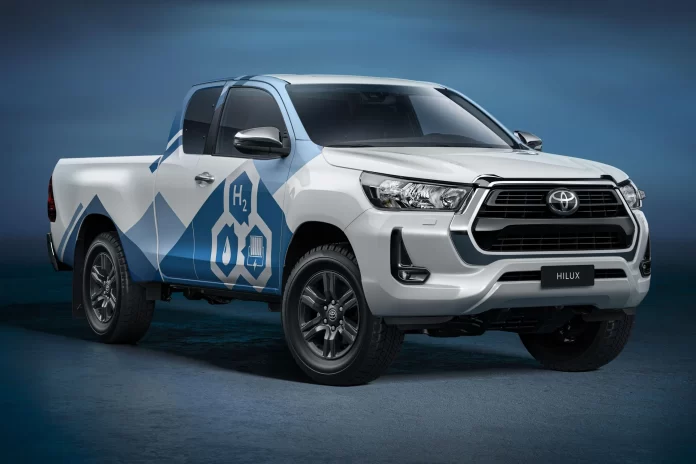Toyota has unveiled a prototype of hydrogen fuel cell electric Hilux. Its debut is a further demonstration of the broad scope of Toyota’s multi-path strategy for achieving carbon-free mobility, applying different powertrain solutions – hybrid electric, plug-in hybrid electric, battery electric and fuel cell electric – to suit different user needs and operating environments worldwide.
The hydrogen fuel cell electric pick-up was revealed at Toyota Manufacturing UK’s vehicle plant in Derby, England, where it has been developed in a joint project with consortium partners, supported by UK Government funding. Hilux is a global icon of the Toyota brand with a reputation for exceptional reliability and durability. The development project has explored how these qualities might be maintained while adopting a new fuel cell electric zero emission powertrain.
Vehicle profile
The new powertrain uses core elements from the Toyota Mirai hydrogen fuel cell electric sedan – technology that has proved its quality in almost 10 years of commercial production. When driven, the fuel cell produces no tailpipe emissions other than pure water.
Hydrogen is stored in three high-pressure fuel tanks, giving the prototype Hilux an expected driving range of more than 600 km – significantly further than might be achieved with a battery electric system. The hybrid battery, which stores electricity produced on-board by the fuel cell, is positioned in the rear load deck, avoiding loss of cabin space.
Project history
The project began in early 2022 with a feasibility study undertaken by TMUK and Toyota Motor Europe. Funding was subsequently gained from the UK Government through the Advanced Propulsion Centre, a non-profit organisation supporting the development of cleaner technologies and new mobility concepts. This enabled the start of an intense design and development programme from 1 July 2022, with consortium partners Ricardo, ETL, D2HAdvanced Technologies, Thatcham Research and additional support from Toyota Motor Corporation (TMC).
Prototype construction began on June 5 this year, working to Toyota Production System principles in a dedicated area within the TMUK facility. The first vehicle was completed just three weeks later, the first of 10 that will be built by the end of this year. These will undergo rigorous testing to ensure safety, dynamic performance, functionality and durability meet the high standards required of a production model.
The project has enabled TMUK members to develop and apply new skills relating to fuel cell electrified vehicles and hydrogen system components. The consortium members have also all played key roles in the initial phase of the programme. Ricardo has supported preparations for the prototype build, carrying out design and development tasks and confirming the complete manufacturing process in parallel with teams at TMUK. Ricardo will undertake complete evaluation of the vehicle over the coming months, prior to a decision on a potential production model being introduced in the second half of this decade.

